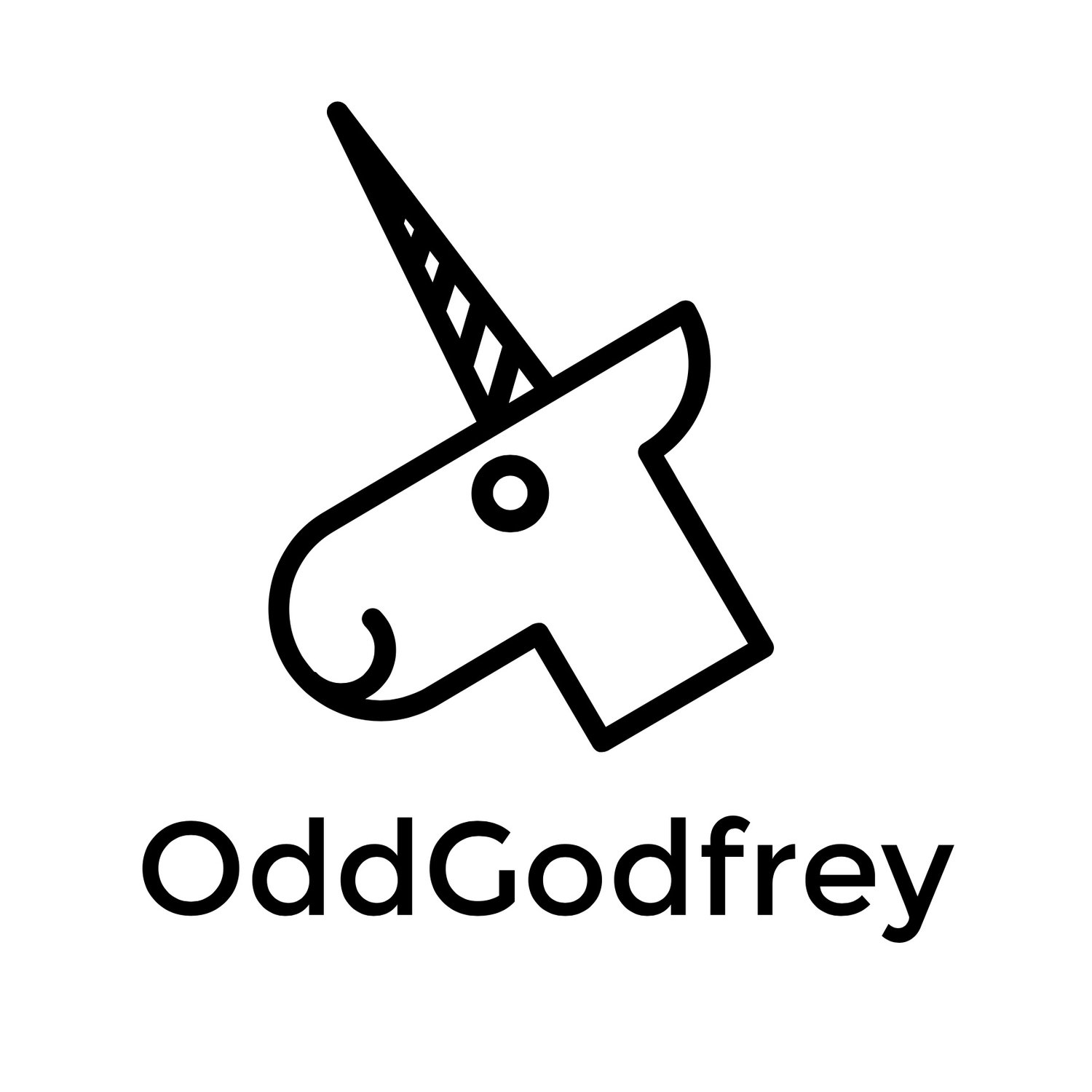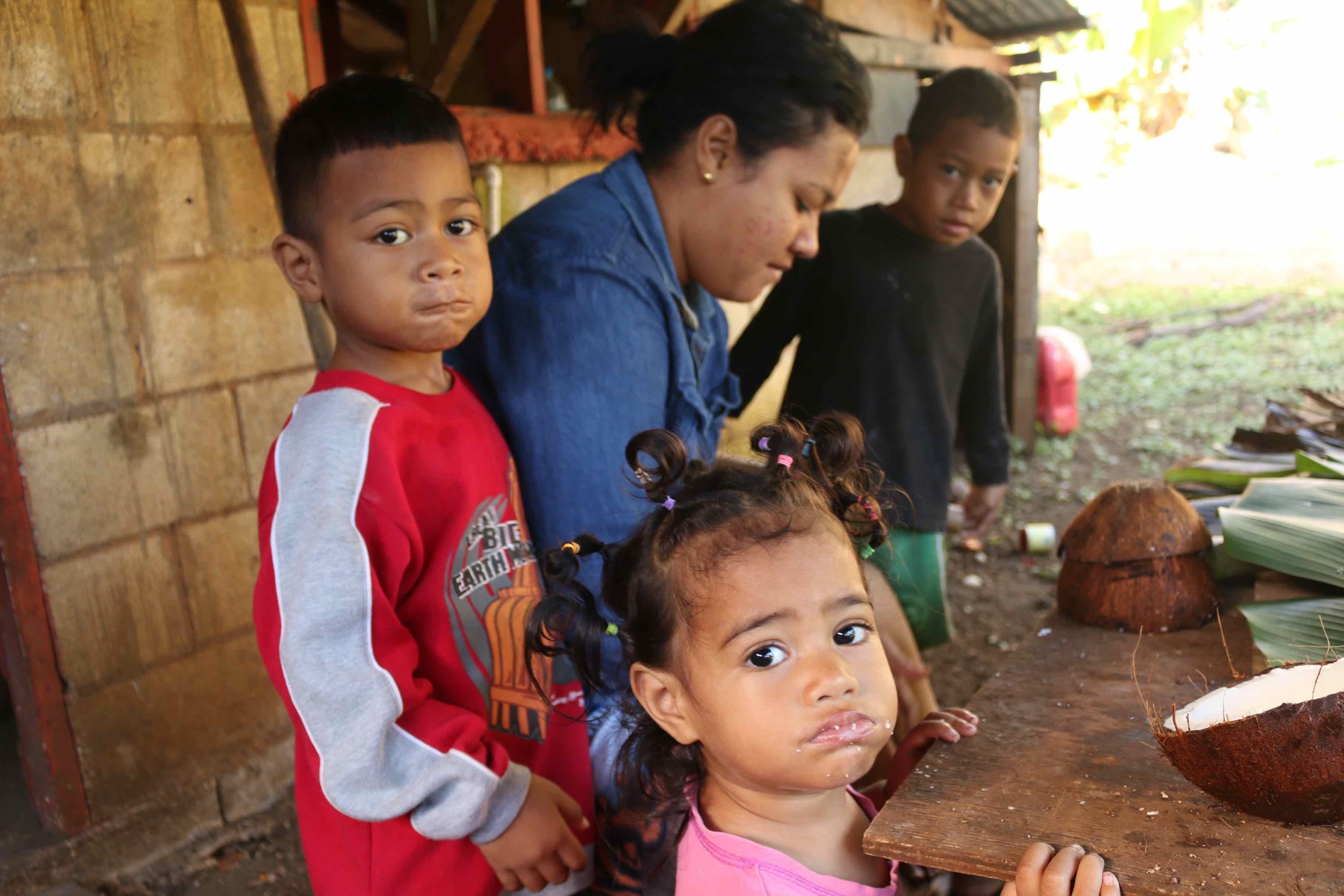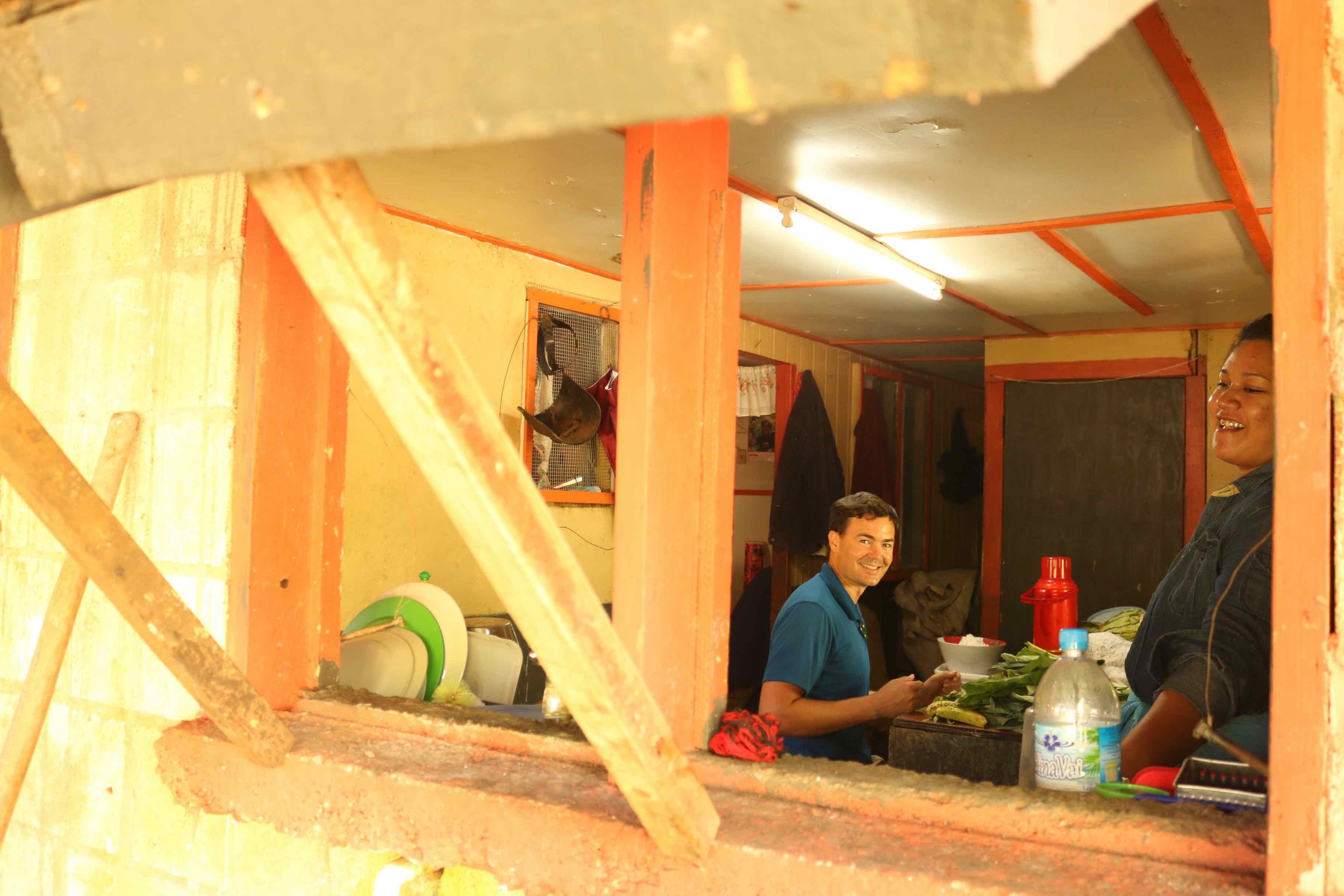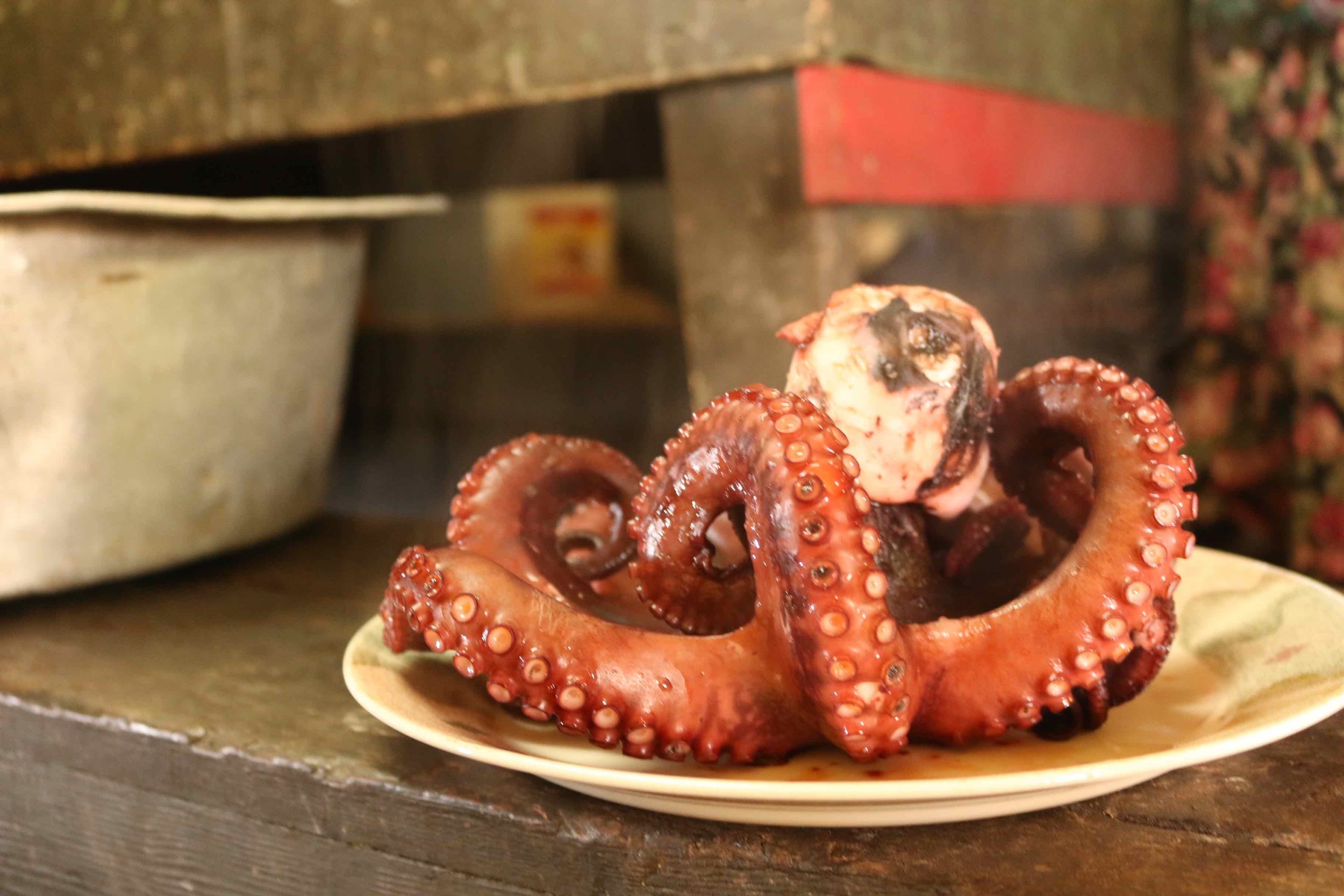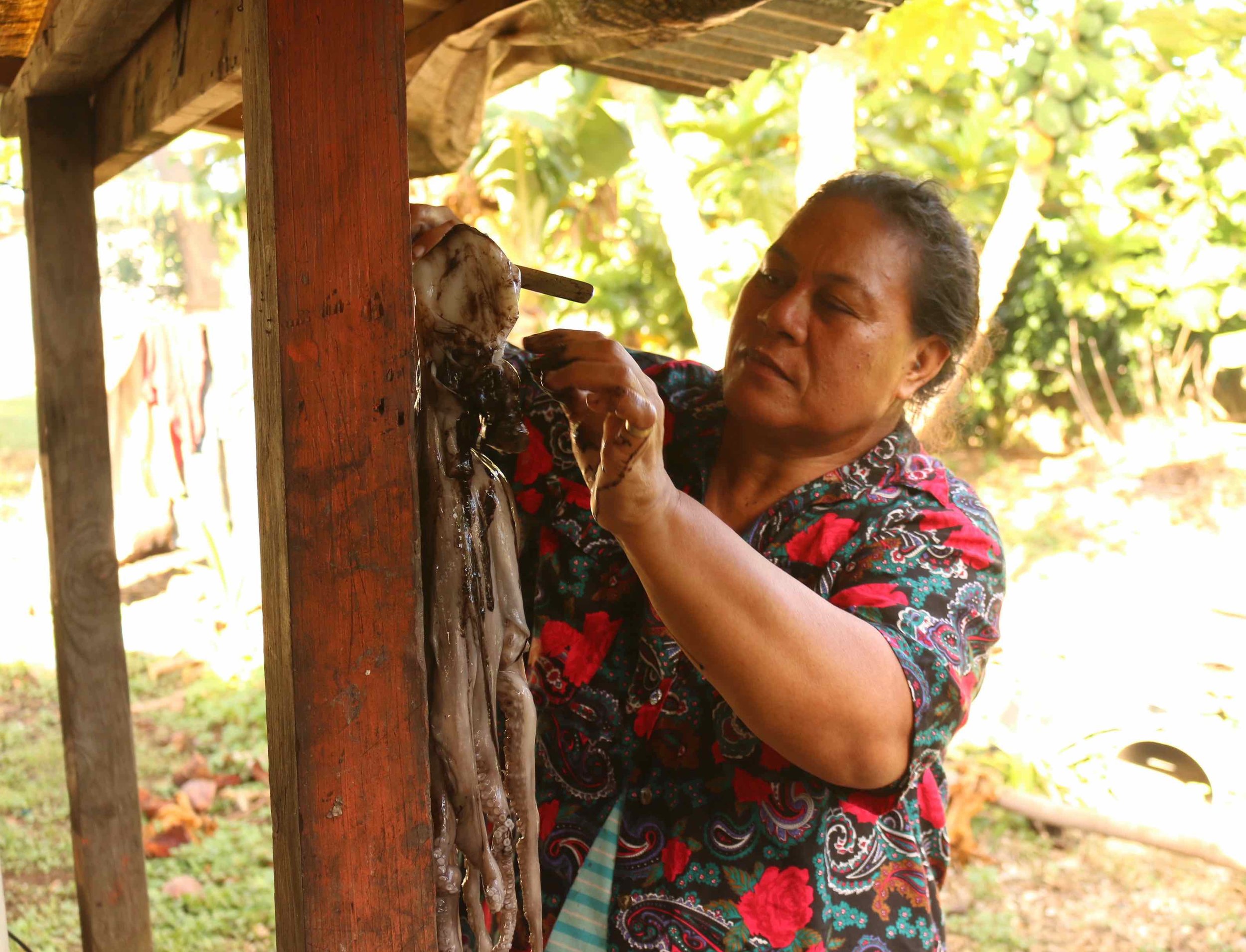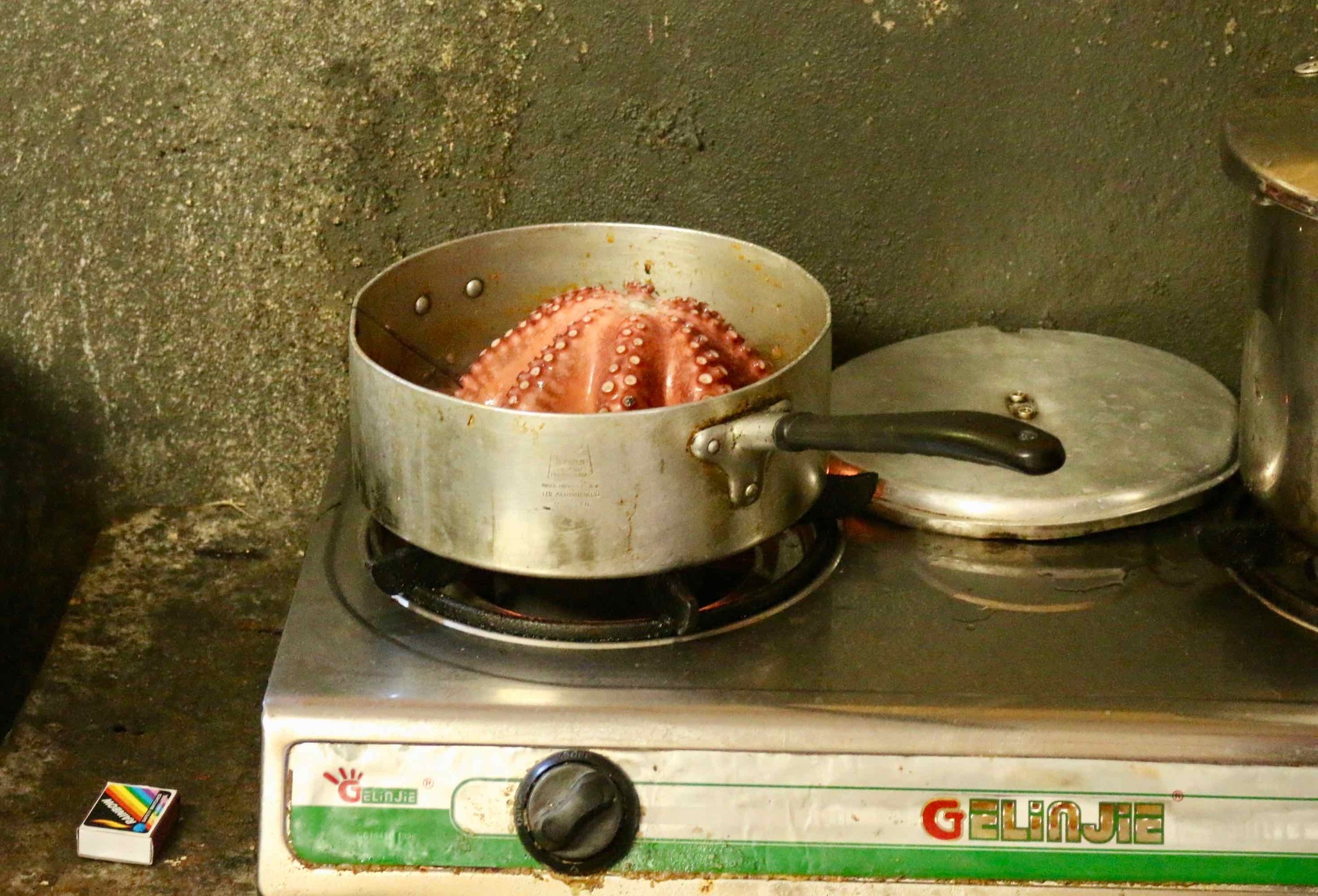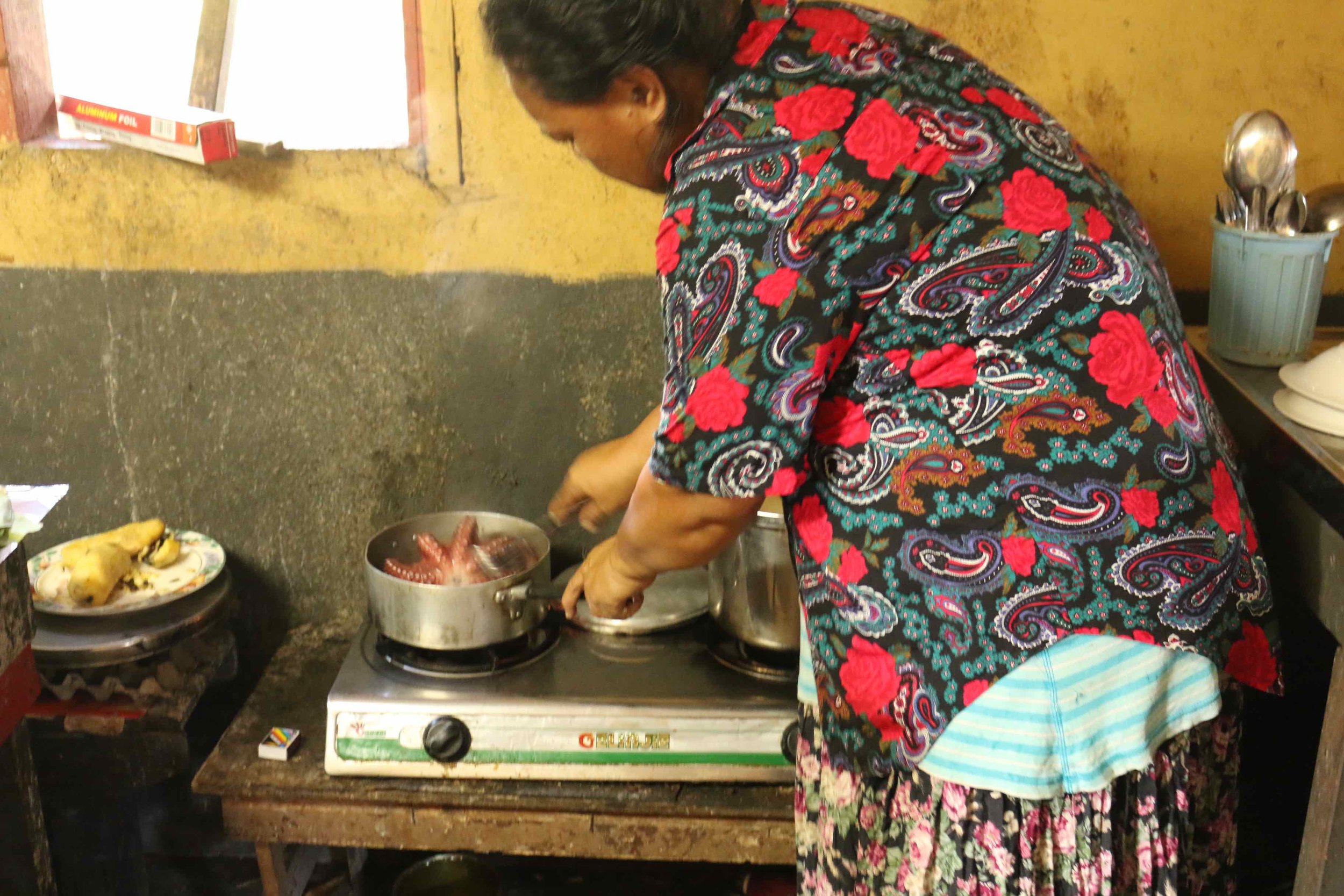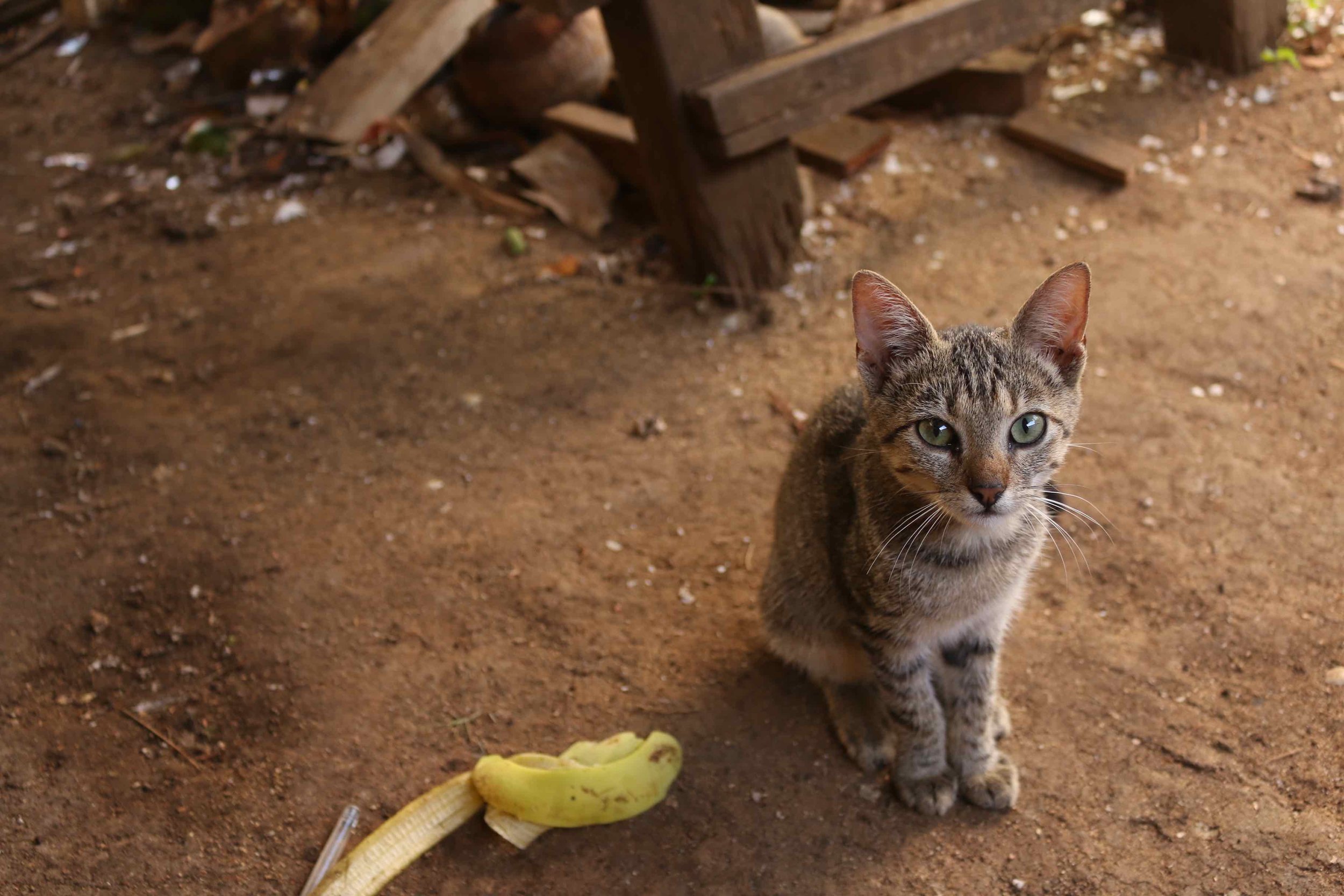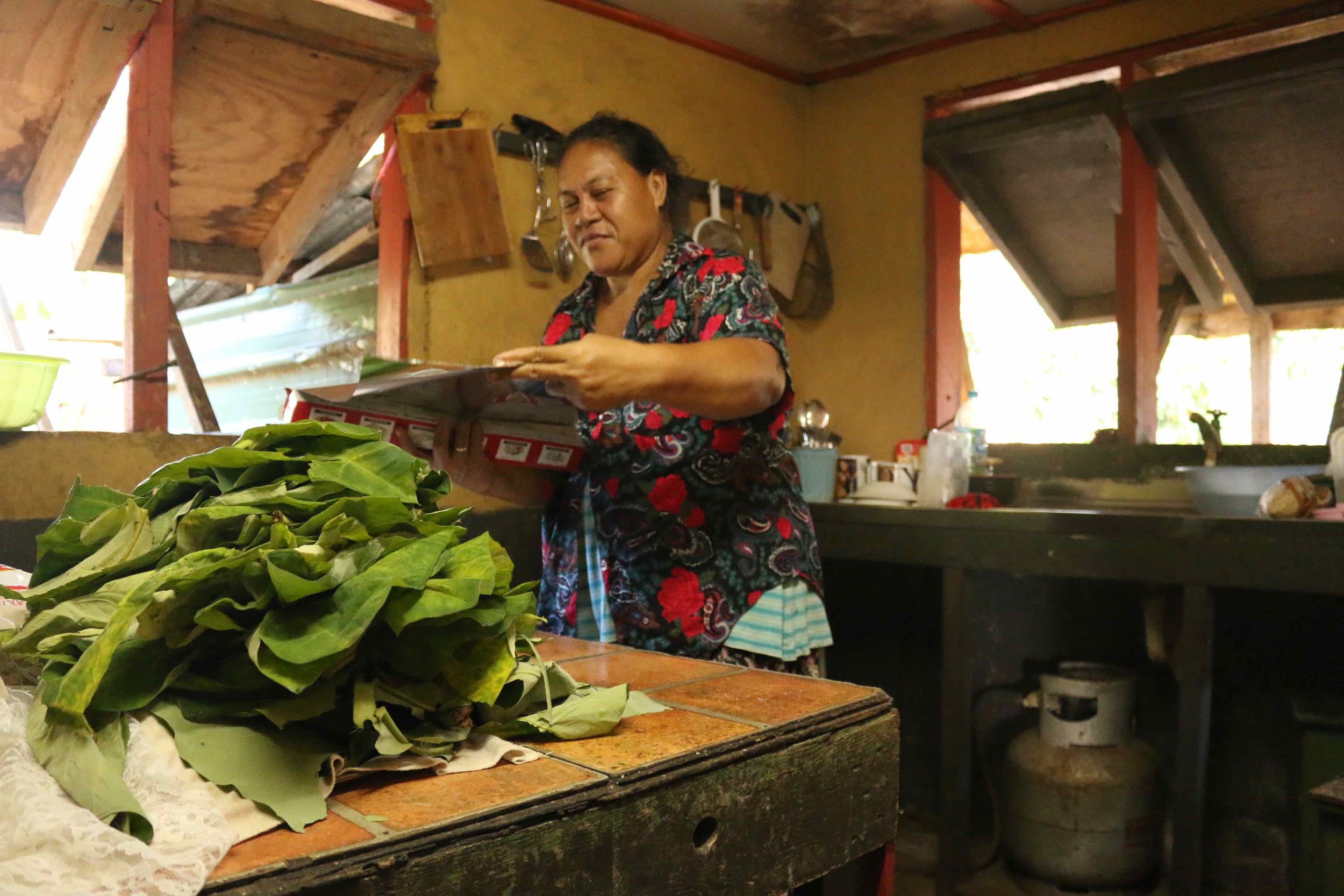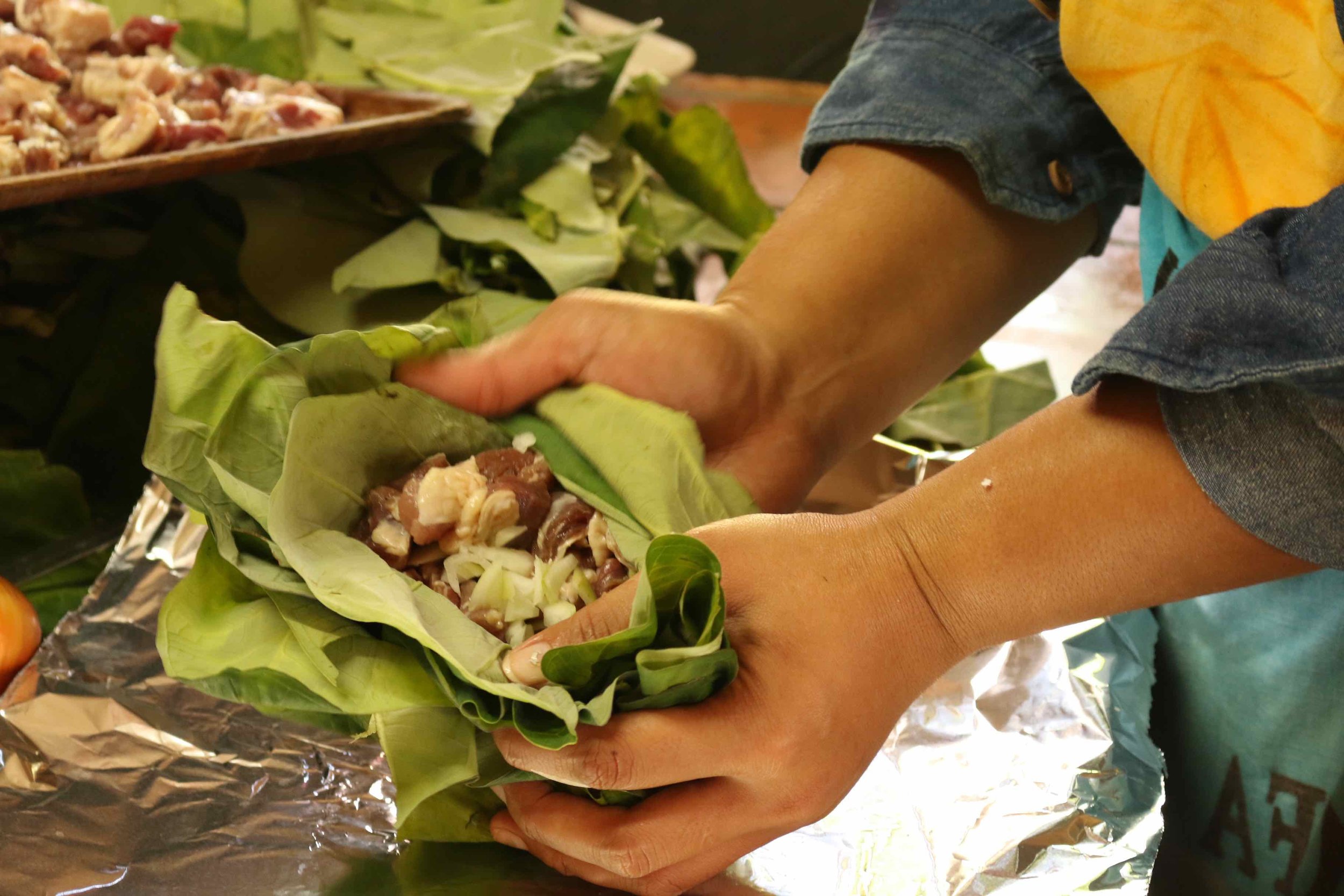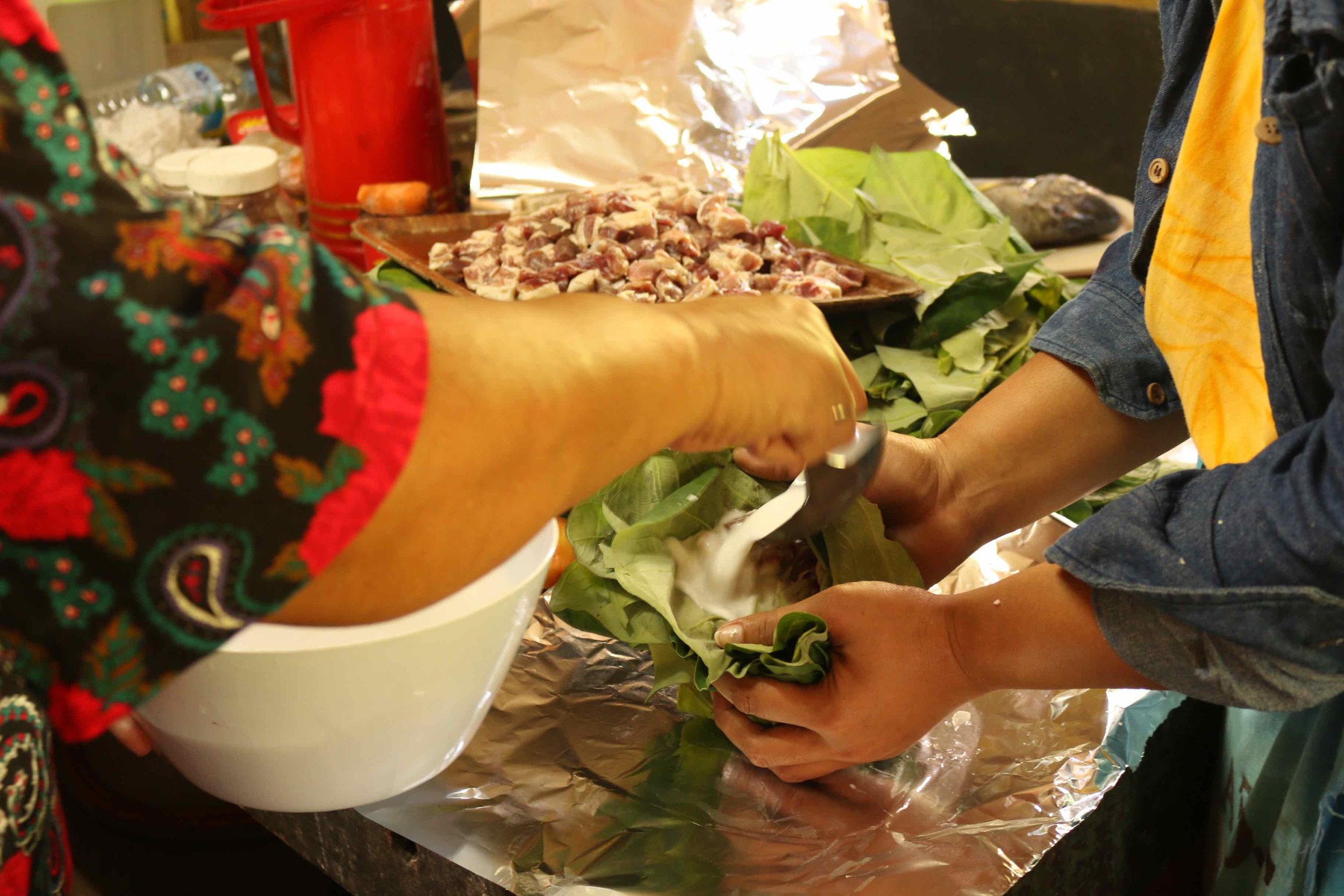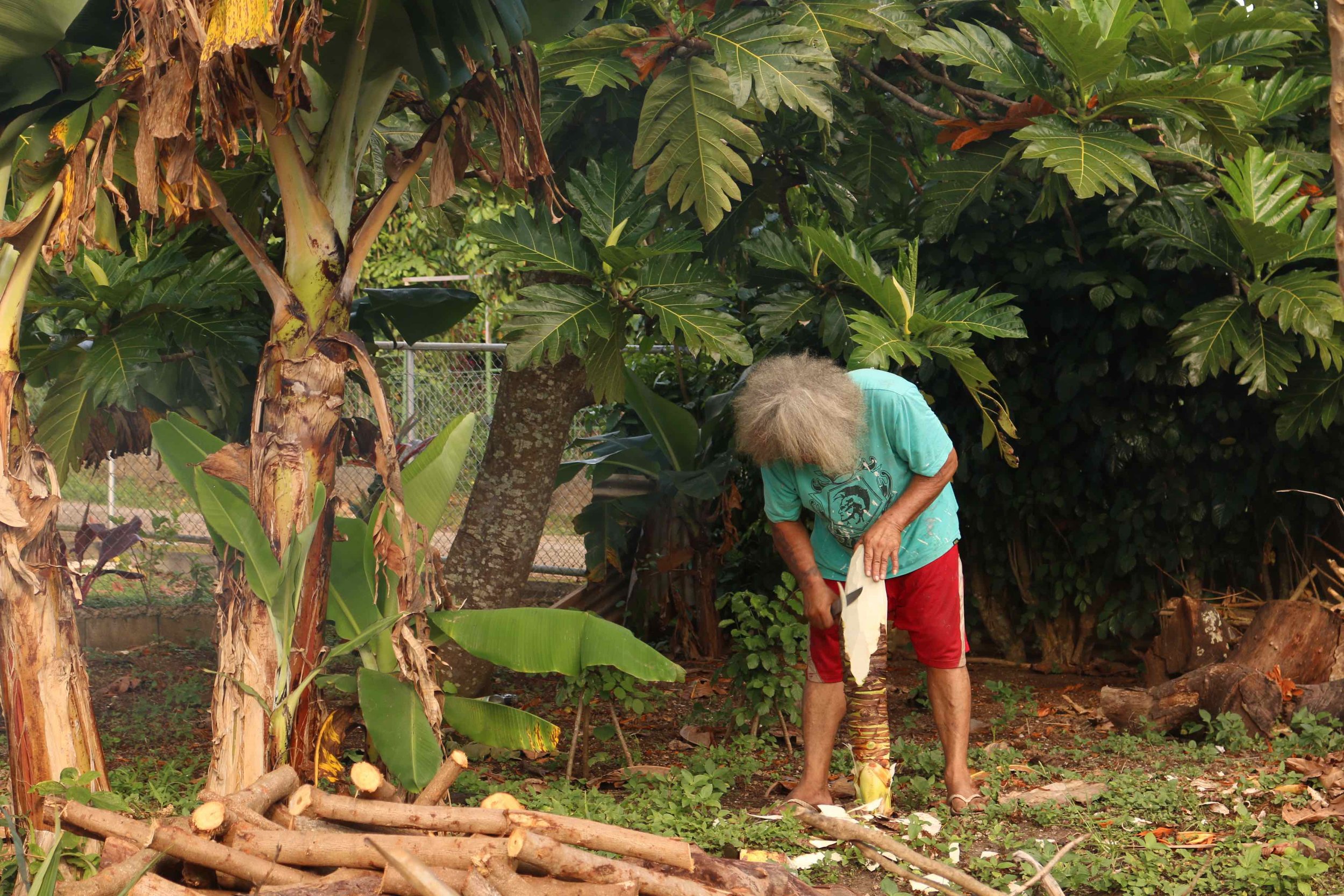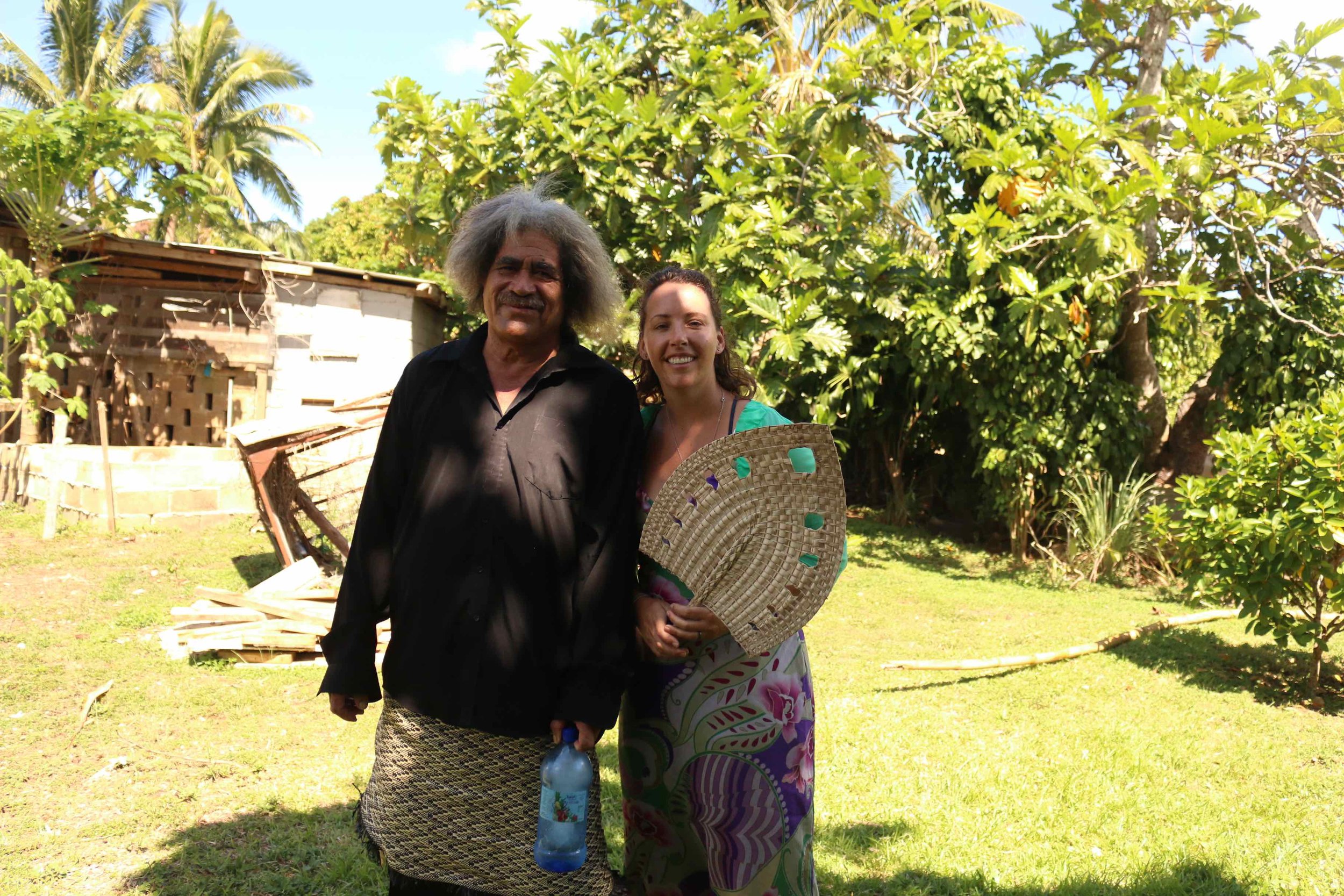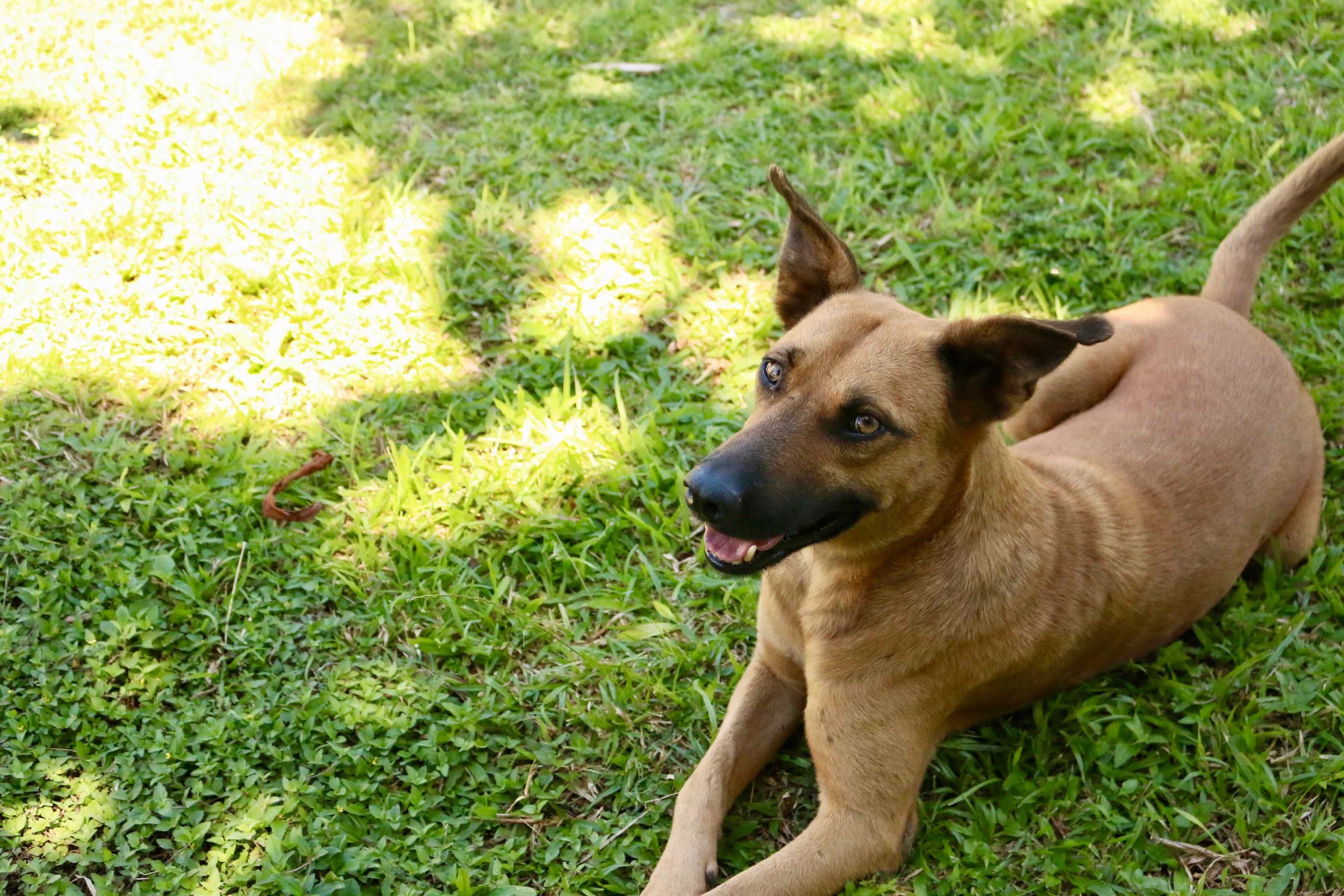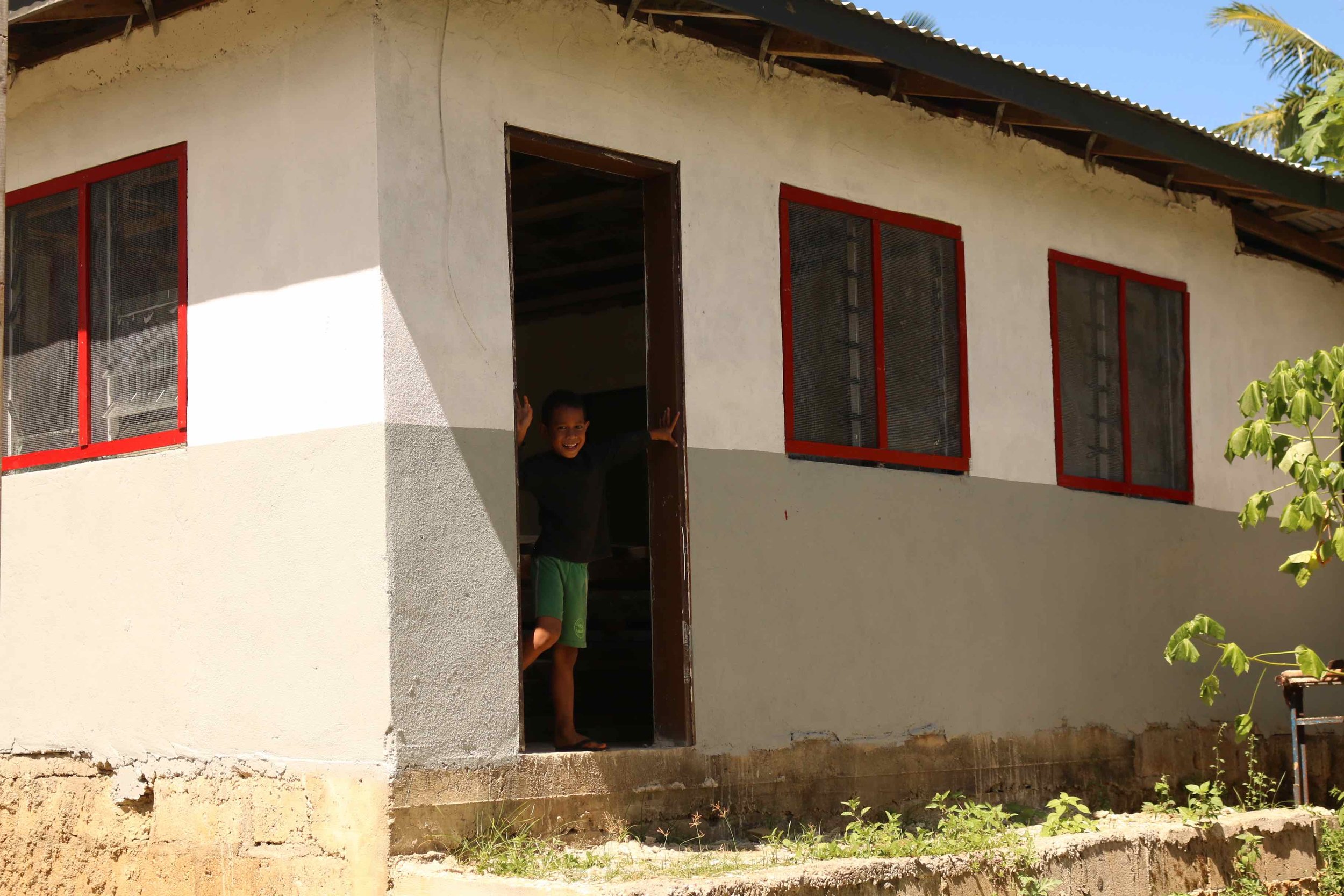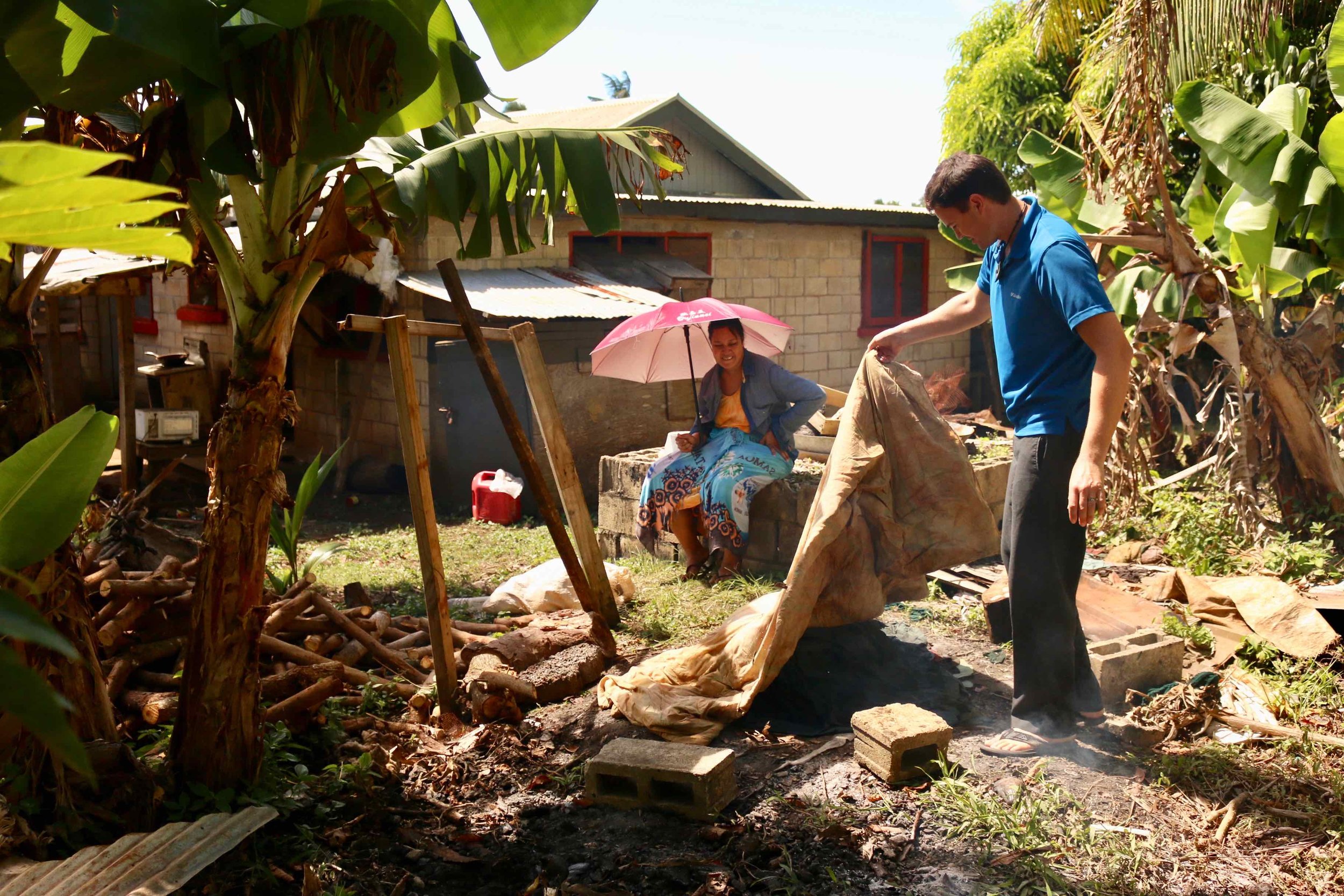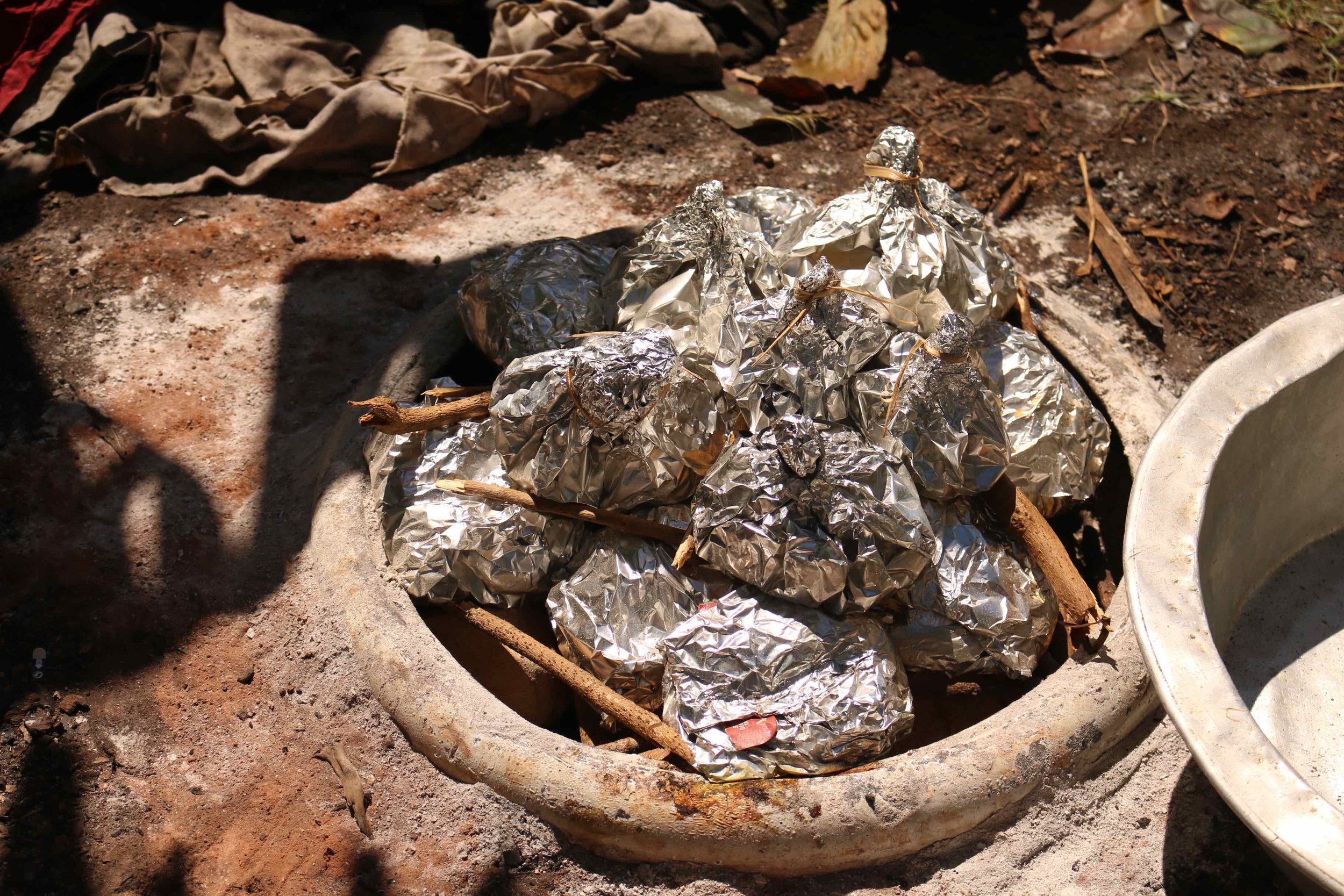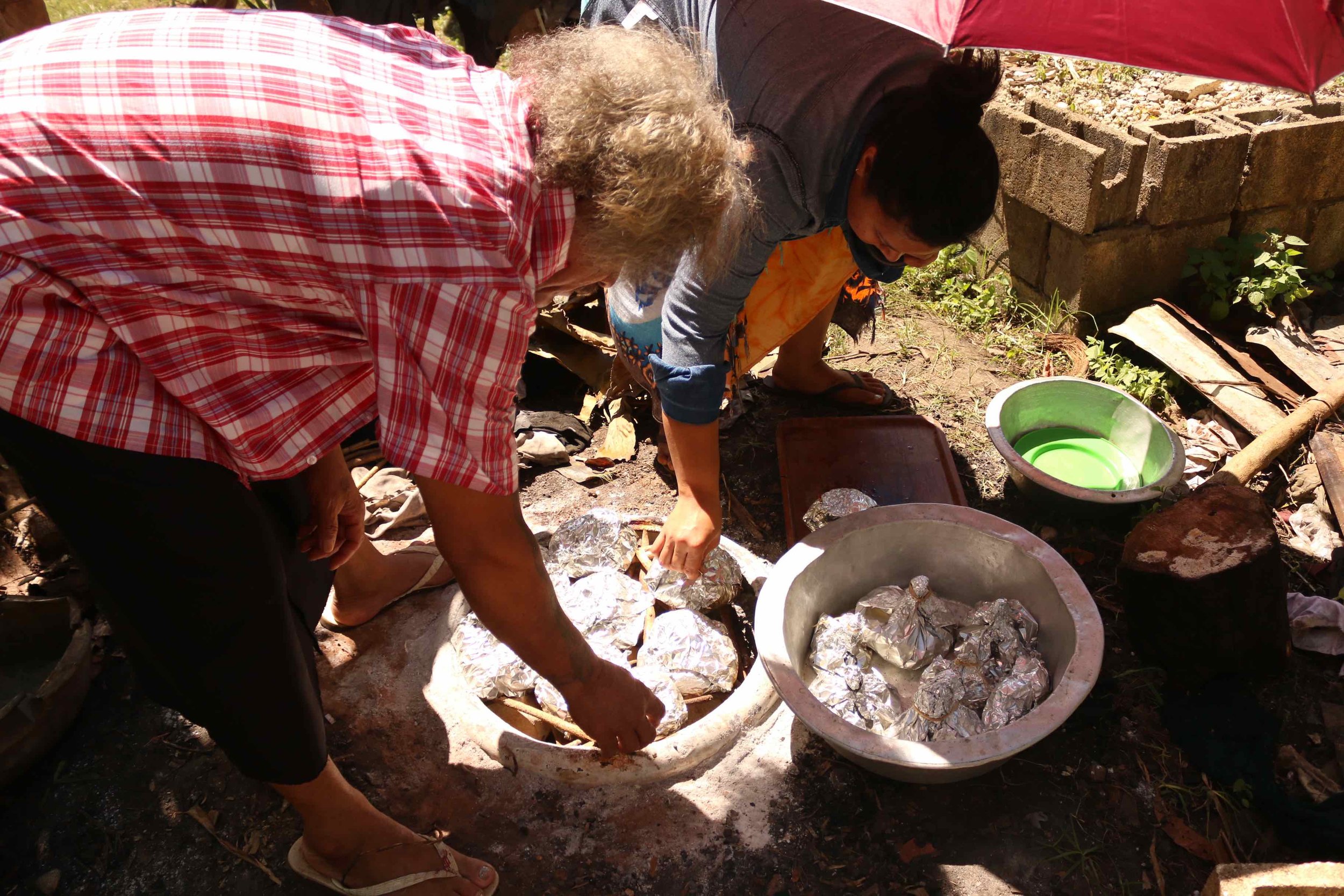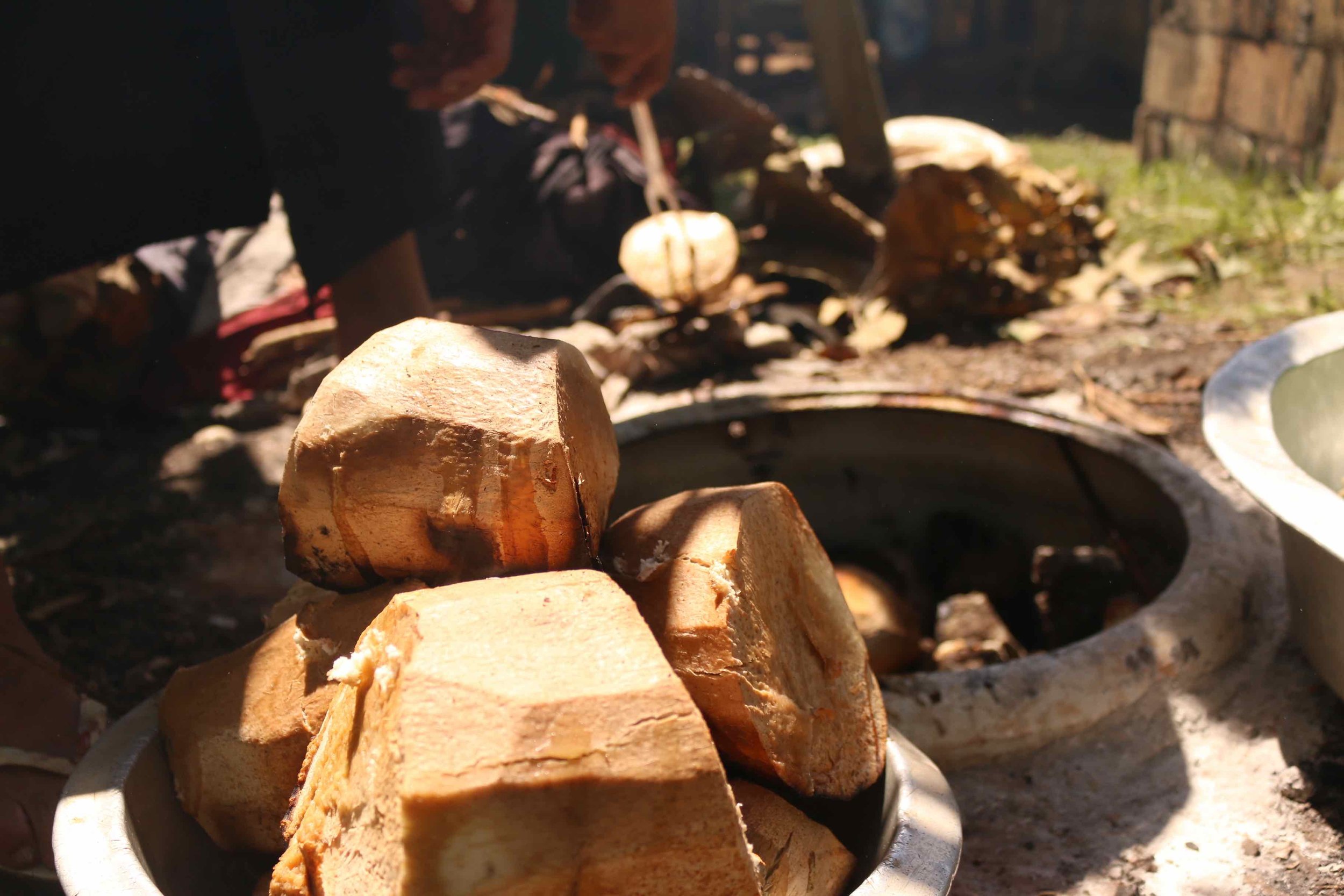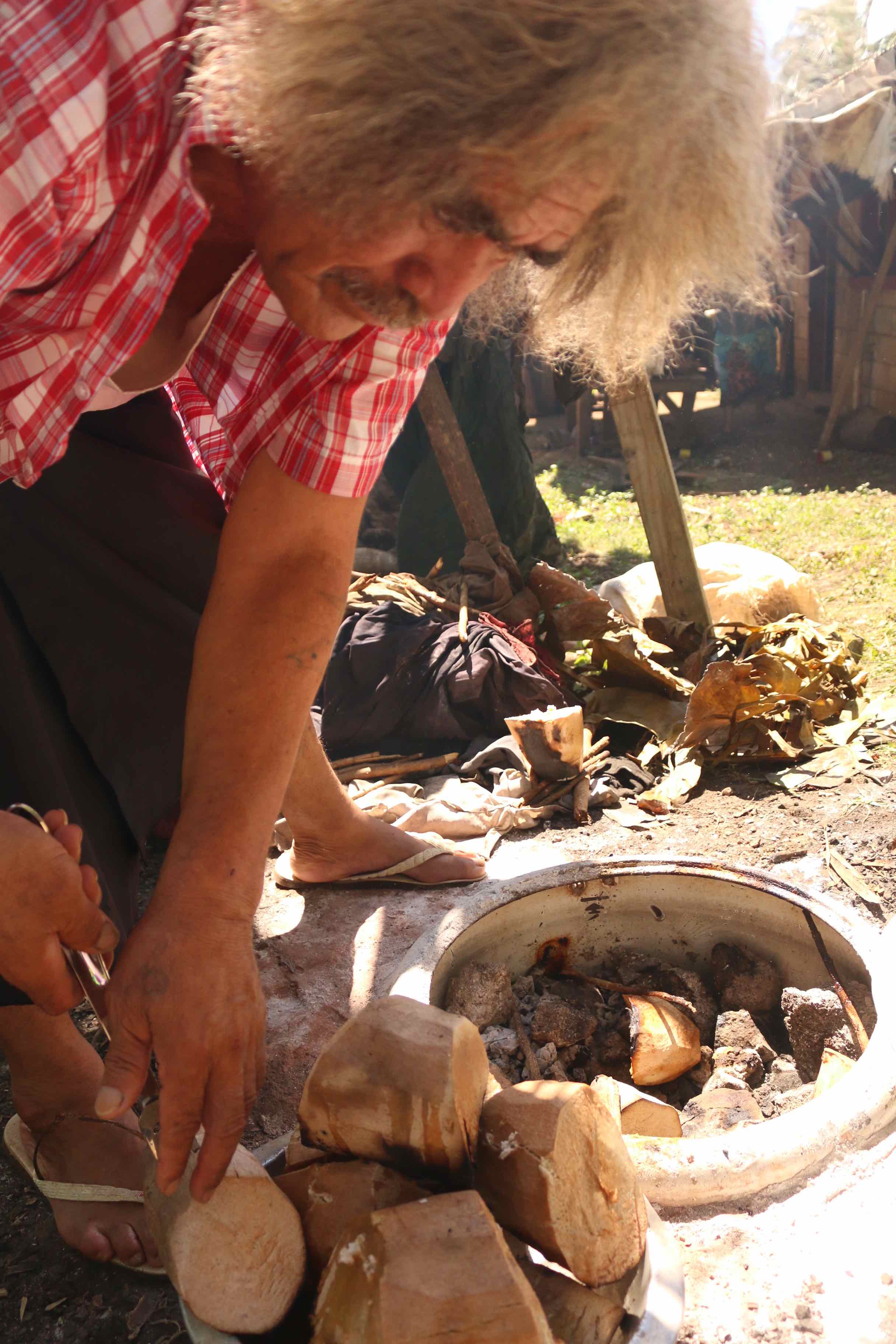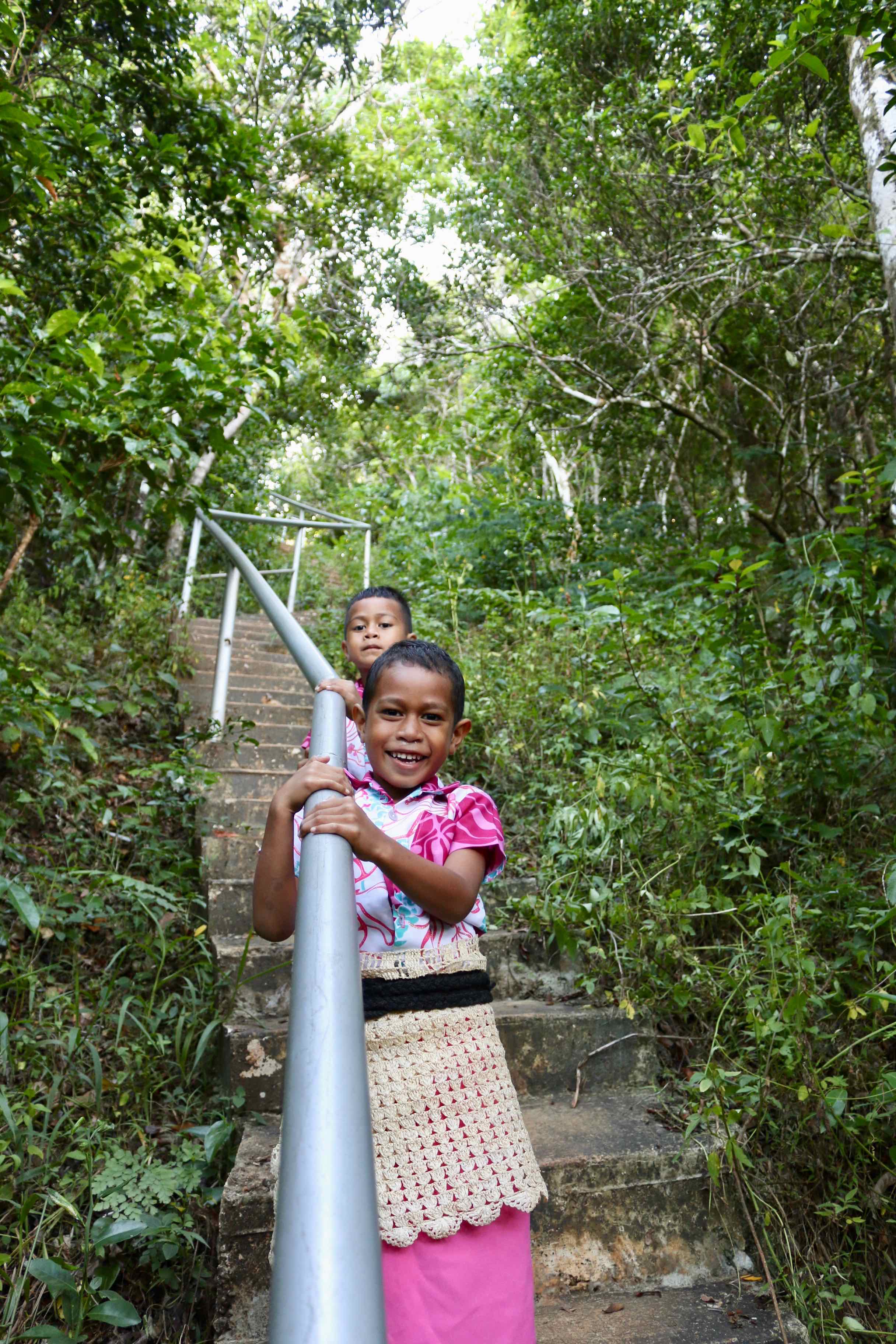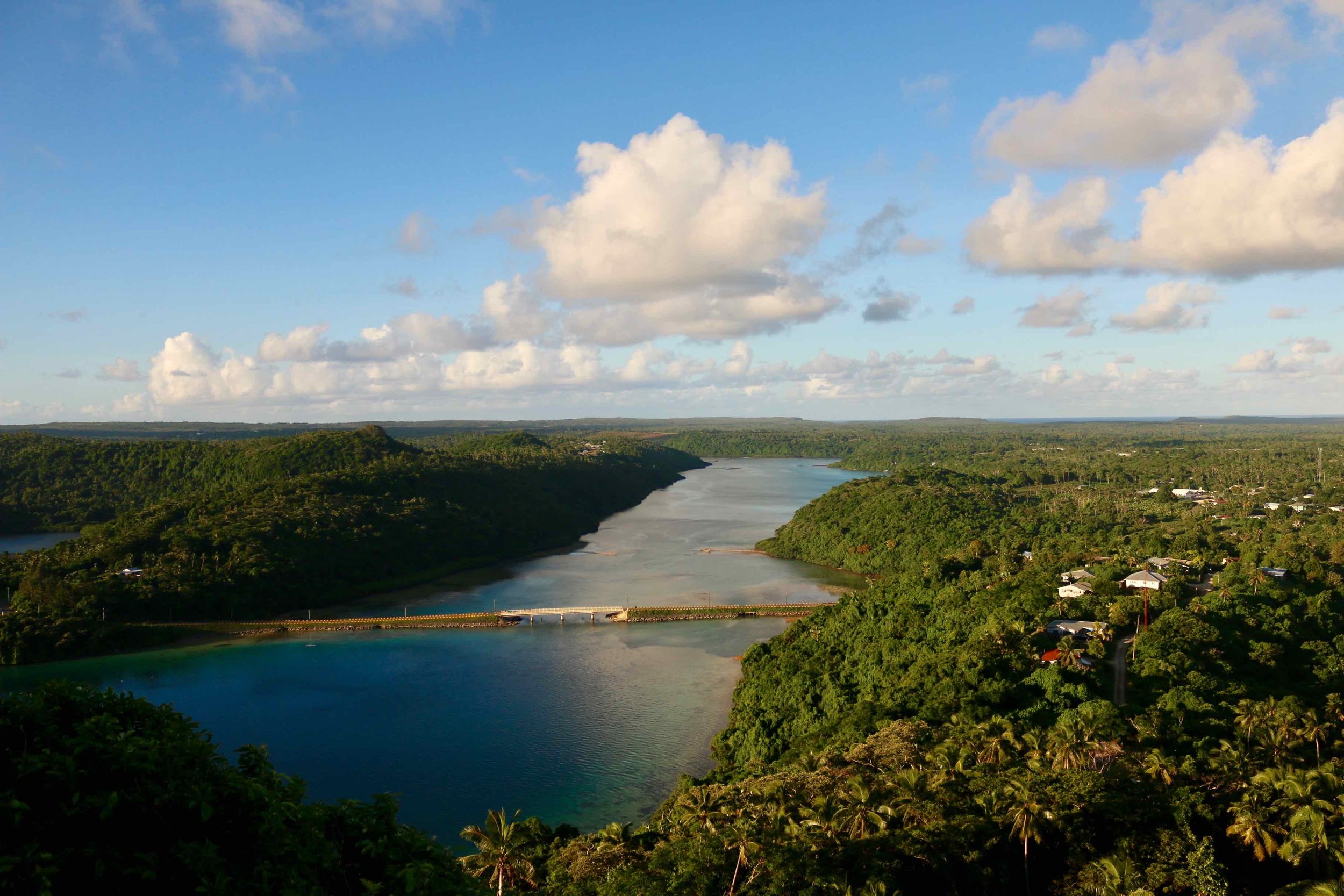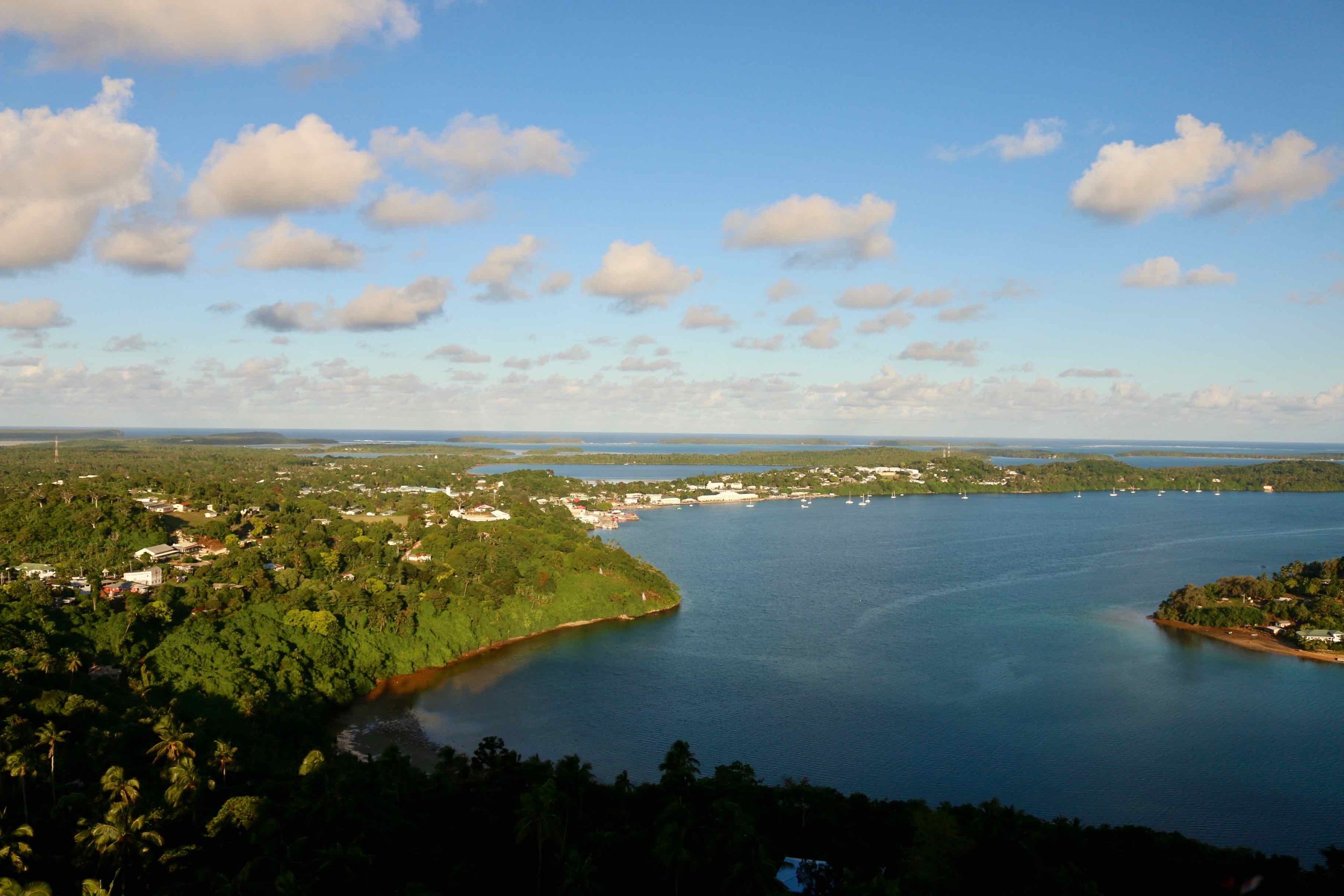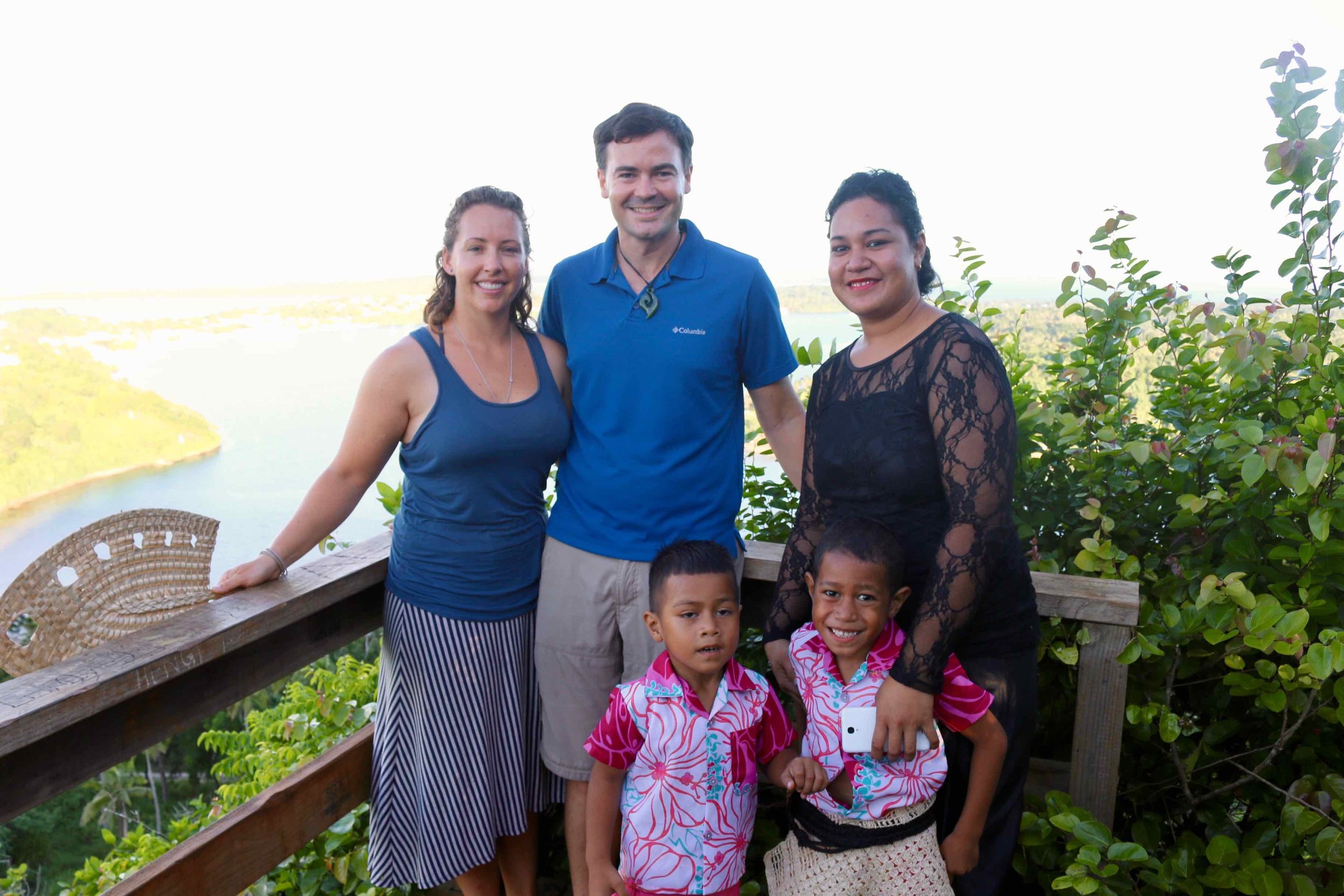Early Sunday morning, the skyline of Vava’u fills with a light haze and we can smell the sweetness of tropical wood smoke. We are the recipients of an invitation to join Freddie and his family in preparing the Easter Sunday Umu, and it smells like it is almost time to join them. Sure enough, about a half hour later, Freddie arrives at the yard and parks his van right next to Sonrisa. We scurry around in haste because he is fifteen minutes earlier than his appointed time, then scramble down the ladder.
“Good morning!” He says cheerfully. “Did you forget we are going to cook the Umu today?”
“Nope, no! We were ready! Don’t I look ready to cook in an Umu?” I ask. Freddie laughs and agrees.
We pile into the van. “Okay, okay!” Freddie says, “In Tonga, the men are in charge of the Umu. I am called The Commander, okay? But Leslie, you can be The Second Commander! I will tell Andrew what to do today, and you can learn so you can tell him what to do next time you make the Umu.”
“Perfect! That sounds good to me.”
We slowly climb up a one lane road dotted with potholes the size of the whole van. Then we turn right, and park next to the entrance to Freddie’s yard nearest the Umu. We climb over a fence made of corrugated metal, through a break between the leaves of Freddie's banana trees. There, we find the Umu already warming up.
The Umu, or an Earth Oven, is a hole dug in the ground lined with rocks. Freddie’s Umu is lined with a metal barrel to keep it tidy. Over the top of the rocks, Freddie has built a fire of wood logs and coconut shells. The smoke stings my eyes and my nose, but Freddie’s grandsons hover to see what is going in next. Freddie takes us over to the house where we meet his daughter in law, Nancie, and wife, T’oah. T’oah means “Queen” in Tongan.
Nancie is seated on a bucket, scraping the meat out of halved coconuts. Wedged beneath her leg is a tool designed specifically for this task: a block of wood varnished to be smooth with a sturdy metal spoon bolted into the block. The spoon has jagged teeth on its front edge, like a medieval back scratcher. She scrapes the meat of the coconut into a bowl beneath her on the floor. She makes it look easy, but I suspect if the Second Commander gave this a shot, what little coconut meat I scraped from the coconut would disperse everywhere except into that bowl.
The Commander takes Andrew inside and seats him at the table. He hands him a pile of taro leaves and instructs him on the art of preparing them to become pouches for wrapping food to be cooked in the Umu. Andrew must tear off the tough stems, then flatten the leaves out on the table with the underside of the leaf facing up. Andrew sets to work, and T’oah comments on finding Andrew “very fast” at his work.
Freddie sets out a chair for me next to Nancie and offers me a banana and a paw-paw with coconut meat on top. They put some of Nancie’s hard-won coconut meat in an upturned coconut shell for a bowl. Delicious.
T’oah is hard at work preparing the Octopus (or F’eke). She hangs a slippery, glistening octopod on a nail hammered into the wooden beam holding up the porch shade. She cuts out the guts, and feeds them to a pig hiding beneath the shade of an upturned boat. The Octopus goes into a pot on a little propane stove to be pre-cooked before going into an Umu pod. I am excited for this, as F’eke has become my favorite Tongan food as of late.
Soon, the coconut is finished being scraped and Nancie turns to making it into milk. She puts the shreds into a large bowl, pours heated coconut water over the top, then lets it soak for a few minutes. Once it is ready, she takes a thin cloth, gathers up some of the shreds into the cloth, then twists to wring the milk from the shreds. She does this over and over again until all the shreds have been properly rung out. This results in a thick, sweet, and nutty milk that is by far and away more flavorful than the swill we buy in cans at home. I have been forever ruined for canned coconut milk by my time in Polynesia. The two grandsons scamper about playing “airplane” with their hands, pausing only to hover over their mother to see how the coconut is coming along. One of the four family kittens stands by in hopes of getting in on the milk action.
Next, T’oah and Nancie work together to fill the Taro leaves with the different items that will be cooked in the Umu. They prepare a layer of tin foil, then pile up a few taro leaves. Nancie layers some corned beef and onion into the taro leaves. She gathers up the leaves and holds it into the shape of a cup for T’oah to spoon in fresh coconut milk. Then, they wrap it in the tin foil and tie the pod shut with a length of dried plant material the Tongans use to weave things.
After this, they repeat the process to make a pod for the octopus, and another separate pod for sliced bananas and coconut milk. They make pods that do not go in the Umu, but are intended to be served cold with pre-cooked crab and pineapple, then raw fish marinated in coconut milk, tomatoes, garlic, onion and lime juice (Ota Ika, Tonga’s version of Tuna Poke).
Meanwhile, Freddie is peeling the taro root, which will cooked directly on top of the rocks. It absorbs a delicious addition of smoky flavor imparted by the fire.
After we have seen the majority of this process go down, Freddie hustles us off to get ready for church. He instructs us to drive his van back to the boatyard, get dressed and return. As Andrew takes the wheel the weighty proposition of not damaging Freddie’s van weighs heavily on his shoulders. But, Freddie is “The Commander” and he is not to be trifled with. So, away we go….
…a half hour later, we return finding Freddie dressed in his church clothes. A black button down, black wrap and his black and tan woven mat around his waist. He put coconut oil in his fuzzy hair, clearly mading an effort to convince it to lay just a smidge flatter than usual. He was so happy the day we accepted his invitation to join him to make the Umu and go to church, laughing and exclaiming that “HE” will be happy, too, pointing to the sky.
T’oah asks me if I would like a fan to keep me cool at church and gives me her woven fan. Freddie, Andrew and I head toward the van. Where is T’oah and Nancie and the kids? “They usually go to church, but I told them to stay and cook.” Oh dear. But not to worry. Tongans go to church at least twice on Sunday, so Freddie will take us to this gathering and the rest of his family will go later that afternoon. Freddie explains all this as he climbs into the back of the van and instructs the Second Commander to take a seat in the passenger side. “Andrew, you will drive.”
“Drive?” Andrew says. Eioh, Eioh!
Freddie looks proud as punch to be sitting in the back seat, windows down. We head out for a full tour of Vava’u via an Andrew driven carriage, in the fifteen minutes before church. We stop along the way to chat with Tongans walking to church dressed in their Sunday best, all wrapped in intricate woven mats. “a;lkjad;iwianl;kajd;lkaj dkjfaiouark;d ddak;uire … palangie…. a;ldkaf;lareupoia adpoiuardpoiu..!” With each stop, we can understand only one word of each interaction: Palangie, and then together Freddie and his Tongan friends start laughing and laughing. We have no idea what they are really saying except we get the gist: “Why is a palangie driving your van???” Or “You have a Pelangie driving your van!” Freddie thinks this is a riot.
We pull up to church, and pile out. Andrew and I sit through the services understanding only one word: “Amen”. Apparently there is no Tongan word for “Amen”. As the readings are read or the sermons are given, the congregation nods with appreciation and hums with a low drone of “Eioh.” Agreement. The Commander of another family gives his son a swift swat to the side of the head, not hard enough to hurt him, but hard enough to make his point: “Behave! We are in church.” When they break out in song, a brass quartet plays along with them, a giant tuba blasting its “Whomp, Whomp, Whomp” along with a congregation singing harmonies with gusto.
When we finish, everyone bounds toward the doors to get into the cooler fresh air. They gather along the side of the street, waiting for their rides to bring the car around. Directly in front of us, an older woman with difficulty walking is escorted onto the tailgate of a rickety, flat bed truck in front of us. Right before my disbelieving eyes, a hydraulic tailgate raises her up like an elevator to the level of the flat bed. Her granddaughter escorts her onto the flatbed to stand holding the roof of the cab for the ride home. All the while, the line of Tongans are cajoling Freddie’s through open windows about the Palangie driving his van, Andrew is trying to back out safely without hitting the woman and her granddaughter (maybe great grand daughter), and Freddie is having a grand old time.
Please enjoy the Artist's Rendering of one of the funnier moments I will experience in my lifetime.
Back at Freddie’s house, we sit in the shade talking until the Umu seems ready. Freddie explains “Once we get the Umu ready, I will take you back to the boat and you can eat half of the food there for lunch. Then, save the rest for dinner.”
Luckily, I had read a little bit about this before coming and I understood. Traditionally, Tongans didn’t eat three meals a day. Instead, they would eat a small breakfast of fruit with coconut meat like Freddie offered us earlier that morning. They would prepare a large meal inside the Umu to cook while they went to work or fishing. They would return for lunch, open the Umu, and eat half of the food for lunch. Then, they hang the remaining food in baskets and snack on it bit by bit as the day progresses. They don’t do this every day anymore, having adopted western 9-5 work habits with the arrival of Christian missionaries. But, every Sunday, they build their Umu and return to a more traditional style.
Andrew couldn’t figure out what Freddie was trying to say, but when I confirmed our instructions, Freddie laughed and smiled. “EIOH! That’s right! This is why you are the lawyer.” Freddie razzes Andrew about not going to enough University and laughs. This guy. Tout'e joins us on the grass hoping to get a scratch behind the ears at some point. The little boys peek out at us, curious about the Palangies.
Soon, it is time to open the Umu. The Commander instructs Andrew to unpile the Umu. Andrew picks up one layer after another until he finds the shiny pods of food. Andrew lifts up several layers of old blankets, banana leaves, a large metal bucket, and then our food stacked upon the hot rocks inside the hole. Freddie takes over and removes the tin foil pods, then the soft and smoky taro root.
T’oah prepares a platter of hot and cool tin foil pods and sends us on our way. Freddie delivers us back to Sonrisa where as instructed, we opened up our pods and enjoyed a delicious lunch. No, the Octopus is not chewy! Octopus only gets chewy when it is over cooked and these Tongans know exactly how to cook Octopus. It is the best.
I know you are tired of this long story, but the day is not over yet. We spend the afternoon relaxing until we hear a small voice calling us from down below. T’oah has arrived at the yard to pick us up. T’oah, Nancie and the kids are taking us to hike Mount Talau and see the beautiful view over all of Vava’u. (Freddie is home napping and getting ready to do his security night shift at the yard.)
We scramble down the ladder again and head over to the waiting van where T’oah, Nancie and all the kids pile into the back. We have to drive again! Only this time, there are three children hopping around without seat belts. Andrew takes the wheel, nervous not only about the condition of the van but the safety of Freddie’s wife and offspring. We make it, though. T’oah and the little granddaughter wait in the car while the boys, Nancie, Andrew and I climb some very off kilter stairs to the top of the mountain.
Beautiful Vava’u!
Then, we turn around and for one last time rumble over the roads, windows down, drawing strange looks from Tongans on the side of the road and even dogs who watch us pass wondering why a Palangie is escorting around their little Tongan family.
